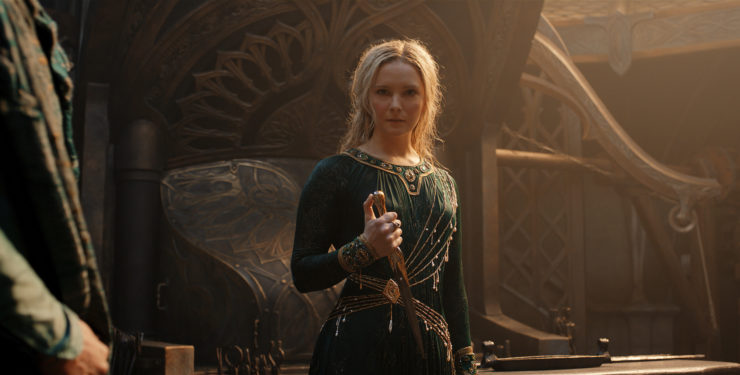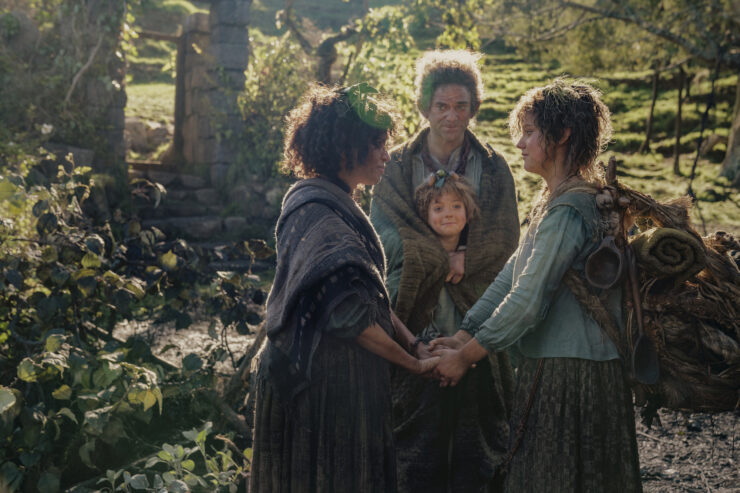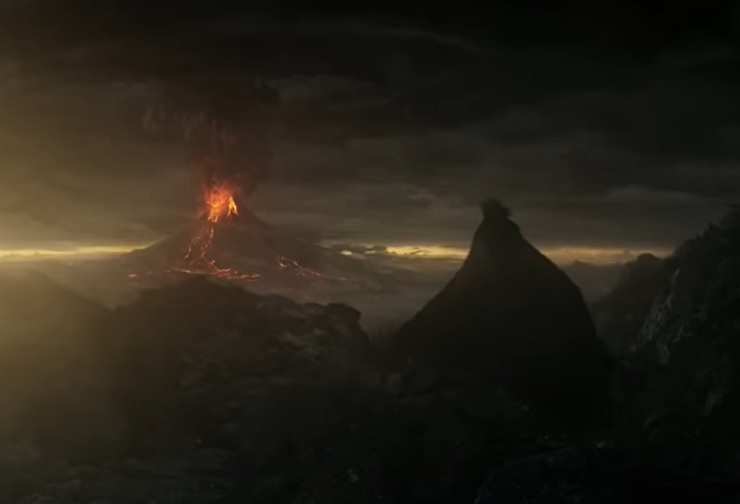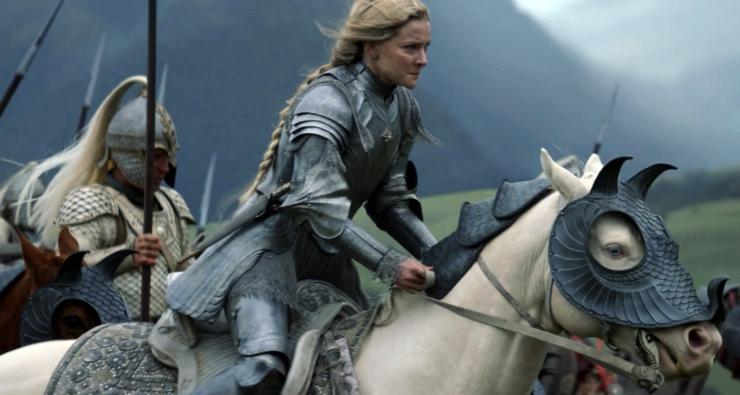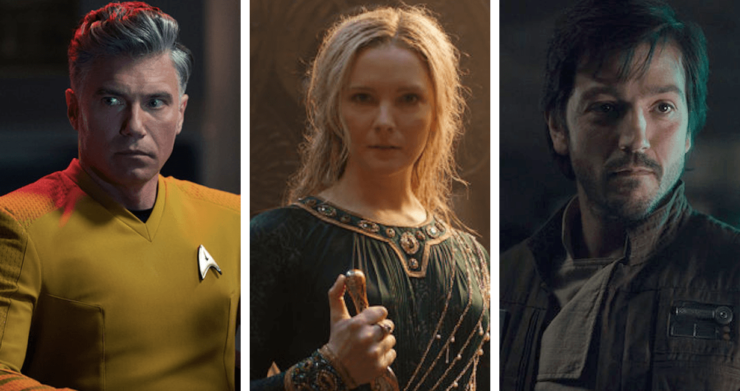Well my dear Harfoots and elf-friends, we have made it to Episode Eight, and the season finale of The Rings of Power. “Alloyed” is a bit all over the place, which is par for the course with this show. It does tie up some storylines while leaving others tantalizingly hanging, and we finally get the reveal we’ve been waiting all this time for—which one of these people is really Sauron.
Recap
The Stranger walks into the Greenwood, where he sees a figure that looks like Nori which transforms into the Dweller. The Ascetic and the Nomad appear, and the three bow to him, calling him Sauron.
In Eregion, Celebrimbor wishes they could find a way to save the elves with the one nugget of mithril. Elrond tells him that they must accept their failure and prepare to leave Middle-earth. Galadriel arrives, shocking Elrond, and asks Celebrimbor if he can save Halbrand. Galadriel and Elrond fill each other in on their respective stories, and Elrond apologizes for not trusting her, promising not to make that mistake again. She admits that she leapt from the ship because she did not feel worthy of going to Valinor, and tells him that neither of them will allow themselves to drown now—they will keep swimming. Once healed, Halbrand comes to Celebrimbor’s workshop, and advises him on combining the mithril with other ores in ways that will strengthen its power.
Eärien, along with some of the other apprentice craftspeople, is given the opportunity to sketch the dying king of Númenor and propose a design for his tomb. While she is sitting with him he wakes, mistaking her for Míriel. He tells her that Númenor must return to the old ways or be destroyed. He urges her to go up into the tower where she uncovers the palantír.
Celebrimbor tells Gil-Galad of his plan to forge a crown using the mithril nugget, using the circular form to have the power build upon itself. As he speaks, Galadriel recognizes some of the words as ones Adar spoke when telling her of Sauron’s work. Celebrimbor seems confused by her questioning of him. Gil-Galad tells them that this plan has come too late to save the elves, and orders them to prepare to leave, but Elrond convinces the High King to leave them behind to try for three months to make the plan work.
Buy the Book
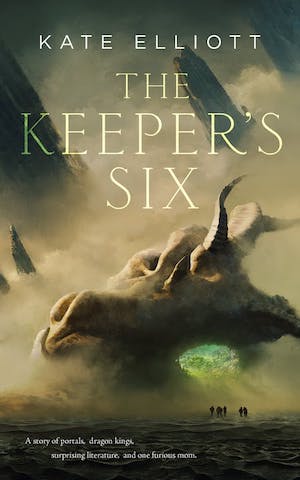

The Keeper’s Six
In the Greenwood, the three mystics tell the Stranger that his memories will return as his power grows. They tell him he will find the stars he seeks far to the east, in Rhûn. They put him to sleep and bind him, since he cannot yet control his powers. Sadoc, Nori, Poppy, and Marigold see two of the three tying the Stranger up. As Marigold leads the captors away, the others sneak in to rescue the Stranger. When they get close, however, the Stranger transforms back into the Dweller. Sadoc is stabbed trying to help Nori escape as Marigold discovers the real Stranger lying in the woods.
The Stranger fights the three, but the Dweller overpowers him. The Harfoots attack her from the trees and bushes, throwing rocks, and Nori steals her staff. She brings it to the Stranger, who tells her he will only hurt her, but she insists that he can choose who to be, and that he is there to help. Just as the Dweller is about to kill Sadoc, Marigold, and Poppy, the Stranger uses the staff to stop her. The three realize that he is not Sauron, but “the Other, the Istar.” He destroys them, and the staff at the same time. The Harfoots celebrate, then realize that Sadoc is dying. They all sit with him to watch the sun come up.
On the ship, Míriel and Elendil discuss the price of sacrifice, and affirm their commitment to what must be done, and to each other. As they enter the Númenórean harbor, Elendil sees that there are mourning flags flying.
Galadriel confronts Halbrand. Realizing that he is Sauron, she attacks him, only to be thrown into her own mindscape. There, her brother Finrod tells her that she has nearly completed his work of bringing peace to Middle-earth. When she denies the vision she finds herself on the raft with Halbrand. He talks of how Morgoth’s death freed him, how he dreams of making up for the damage he did while serving Morgoth by uniting Middle-earth again. He offers to make her his queen, telling her that she will bind him to the light and he will bind her to power. Galdriel rejects him again and finds herself drowning in the sea. Suddenly, Elrond wakes her and she finds herself instead in the river in Eregion.
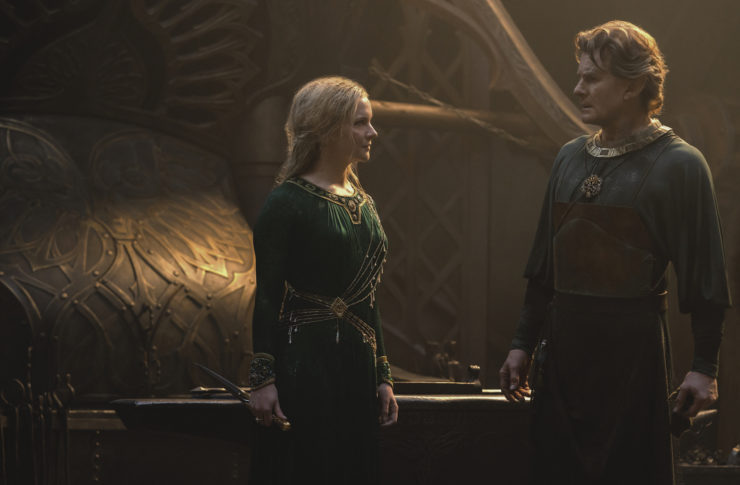
She tells Elrond and Celebrimbor that Halbrand has gone and they must never treat with him again, but provides no further details. She asks Elrond to keep his promise to trust her, and tells them that they must make three rings, not one, because one will corrupt, and two will divide, but three will keep balance. Celebrimor tells her that they need Finrod’s knife—only gold and silver from Valinor will work with the mithril.
The Harfoots prepare to travel, but Nori’s family tells her that she is part of something bigger now, and that she belongs out in the world. They urge her to take care of the Stranger, and everyone shares tearful goodbyes. Poppy and Nori remind each other of their friendship and promise to see each other again. Nori asks the Stranger which way to Rhûn, and he picks a direction.
Elrond, Galadriel, and Celebrimbor finish the three rings. Elrond looks at Galadriel with concern. The reflection of the volcano shows in Halbrand’s eye as he hikes down into Mordor.
Analysis
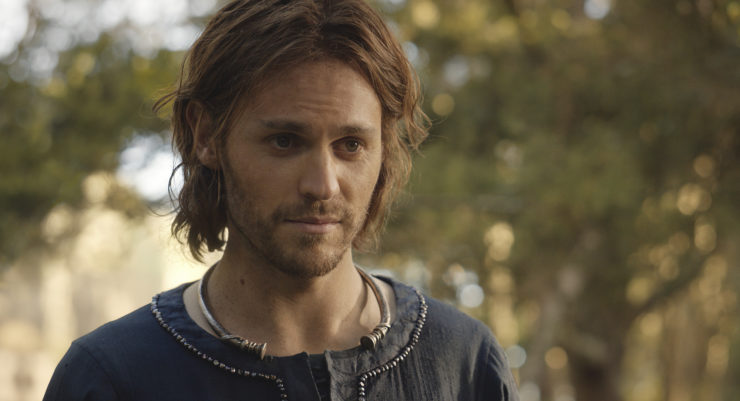
I owe an apology to The Rings of Power after complaining so much about Halbrand and the fact that he felt pointless as a character. I keyed into his true identity the moment he showed up in Celebrimbor’s forge, but I will admit that it never even occurred to me to consider that he might be other than what he seemed to be until that moment. It was clever of the writers to play off the trope of a returning king, a trope we all know well from The Lord of the Rings and wouldn’t question—I didn’t even like the idea, and yet I never thought to question it either. I assumed the show felt like it had to have an Aragorn figure and just shoved one in there—The Rings of Power played me, and I am here for it.
Of course we knew that someone we’d been introduced to had to turn out to be Sauron. I never for a second believed the Stranger was him (though I enjoyed the fact that the mystics got it confused this episode). I did think it might be Adar at first, but I knew that Sauron had to also be in Eregion to make the rings, that he had to be in his “fair guise” as the text put it, so Adar didn’t really explain everything. I was stumped, and I’m impressed that the show managed to craft the sort of mystery in which the clues only make sense after the reveal.
The fact that he said that he got the southland king’s seal off a dead man and that turned out to be true. The fact that Halbrand will, actually, become the ruler of the Southlands, under different names for them both. The fact that he really did have a beef with Adar—it was just a very different one than we all supposed. I also really liked how the revelation about Halbrand tied up the loose questions about Adar. I was desperately curious to know how much of what he claimed to have done to Sauron was true—he may or may not have believed he actually killed Sauron, but the story of betraying Sauron to free the orcs from their slavery is true, and that’s why Halbrand wanted to kill him.
Of course, the orcs aren’t going to end up free for long, now that Sauron is on his way to take over their new home. And of course, Adar has some pretty horrible vengeance coming his way now, I think. Sauron probably let Galadriel stay his hand partly to preserve his cover and connection to her, but I bet it was mostly so he could exact a more terrible punishment than a swift death. I wonder if he knew that the sword hilt wasn’t in the bundle—it seems like the sort of thing he should be able to sense.
The connection between Galadriel and Halbrand/Sauron is very hit or miss. I’m intrigued by the question of whether Sauron was playing Galadriel from the start, or if he really had given up and was actually inspired by her to try again for power and his so-called peace on Middle-earth. The idea that Sauron’s goal was to repair the division caused by Morgoth and unite Middle-earth was seeded in other episodes, and comes to fruition here as “Saubrand” tries to convince Galadriel to join with him, to be his Queen and bind him to the light as he binds her to power, as he puts it. Galadriel was obviously not part of his original plan. But it is a very different story if he was just biding his time on that raft and in Numenor, or if Galadriel’s words really did inspire him to action as he claims. It’s a very different story if The Rings of Power is suggesting that, had Galadriel stayed on that ship and returned to Valinor, Sauron might have given up and died.
Some of these questions may be answered in future seasons, while some may remain a mystery. But the show does a great disservice to the character of Galadriel in suggesting that her future ambition and desire for power comes from Sauron’s words to her. When he suggests the kind of queen she could be he uses two bits from the speech Galadriel gives when Frodo offers her the One Ring in The Fellowship of the Ring—“Fair as the Sea and the Sun” and “Stronger than the foundations of the earth.” If the show means us to believe that Sauron planted this lust for power in her head, that’s a really poor choice, and disrespectful to the character as well. If his words are instead meant to acknowledge something that actually exists in her, then we needed to see enough character development from Galadriel to recognize that.
Saubrand tempting Galadriel with his belief in her is a more convincing and poignant move, since the show has established how she often feels disregarded and distrusted by her fellow elves. Elrond’s apology to her in the beginning of the episode helps drive this home, and it is significant that we see him doubt anew as she refuses to tell him the truth about Halbrand and how she ended up in the river. I feel as though the show could have tightened up its plot in the middle of the season and left more room to expand on Galadriel’s desires. Having driven home the idea that she is a war-weary veteran who craves peace but cannot stop fighting, the show had room to add power-hunger into her character. Faced with a king who would not listen to her and who sent her away, “into exile,” as she puts it, it would make sense if Galadriel came to believe she would make a better ruler than he. Faced with the fading of the elves, she might have been drawn to the idea of seizing a power that could save them. If the show had offered us a character who we believed might see some appeal in Sauron’s concept of peace under a tyrannical rule, the confrontation would have been more interesting and fraught, and the parallels between the two characters might have come to a better conclusion.
I did like the symbolism of making the three rings because it created a balance of power. “One will always corrupt” is a good allusion to the eventual forging of the One Ring, and although Saubrand’s temptation of Galadriel wasn’t as effective as I wished, the idea that she saw the danger of a single ring through her encounter with him is a good one. However, I really wish they had managed to make those rings look better. And why is only one ring hued silver while the other two are gold given the breakdown of the metals in the forge?
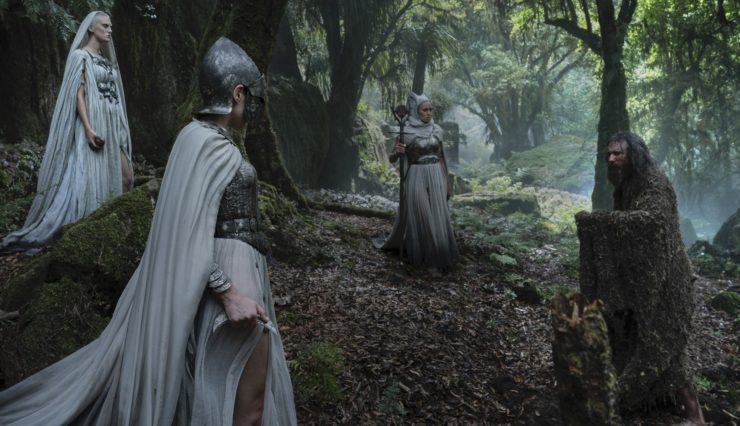
The encounter between Gandalf and the three mystics was really enjoyable, despite the wizard fight reminding us that The Rings of Power is still just using all of Jackson’s moves. I kind of want to rename the series Looking for Sauron now—Galadriel has been, we have been, Waldreg was, and now these three are. And it’s a neat idea that the newly-arrived-Gandalf might be mistaken for Sauron, since they are both of the same stock, both Maia, powerful spirits attached to the Valar. Amnesia Gandalf (or Olórin, as he was originally called in the language of Quenya) doesn’t currently remember that the Valar tasked him to take solid form and go to earth to help deal with the Sauron problem, but he recognizes the details that Sauron’s followers are telling him—the are true, all except the assumption that he is Sauron.
Despite the cheesiness, I really enjoyed the moment before he destroyed them, when the three were trying to lay titles on him and claims of who he was, and he just answered “I’m good.” I also thought that his last scene with Nori, which referenced the “when in doubt, follow your nose” advice he will later give Merry in Fellowship, was basically perfect. The show has done far too much referencing, but this one was fairly earned, and a great way of finally confirming for us that this is indeed, the Wizard who will one day be called Gandalf the Grey. They should have ended the season on that scene, in my opinion.
However, I don’t think the show benefited at all by Sadoc’s death. I don’t think the message of sacrifice was particularly effective here, although Lenny Henry still pulled at my heartstrings with his portrayal of the old Harfoot’s final moments. The scene between Míriel and Elendil was really beautifully scripted and covered the theme of trusting that hard sacrifices will be worth it, though. It would have made much more sense thematically for the Harfoots to have a different experience, and Sadoc’s survival would have been more moving than his death, just as Sam and Frodo’s rescue by the eagles was more moving than having them die on the slopes of Mount Doom.
I was very intrigued by the fact that Eärien was the last one to speak to the King, and perhaps went to look in the Palantir. So far the show has done nothing with her character and I’ve wondered why she was added, but it seems like they’re gearing her up for a more pivotal role in season two, which is exciting. Knowing that there’s more strife coming for the Numenoreans, especially with Pharazôn’s schemings, is one of the things that has me intrigued about the future of the show. And of course Isildur will eventually show up again, and Míriel has promised to return to Middle-earth.
All in all, this first season of The Rings of Power suffers from the same problems that much of today’s fantasy and genre television and film suffer from; the need for everything to be connected to everything else, the need for every story to be bigger, more intense, and more violent than the last, and the desire to pack so much into every second of every episode that the viewer rarely has time to breathe. Unless a viewer is coming to the show with an intentionally critical eye, it’s hard to catch all the flaws because so much happens in every episode that there’s no time to think about any of it—we’re already off to the next bit. It can help make such shows enjoyable, popcorn-munching binge watches, but it doesn’t leave us with much substance.
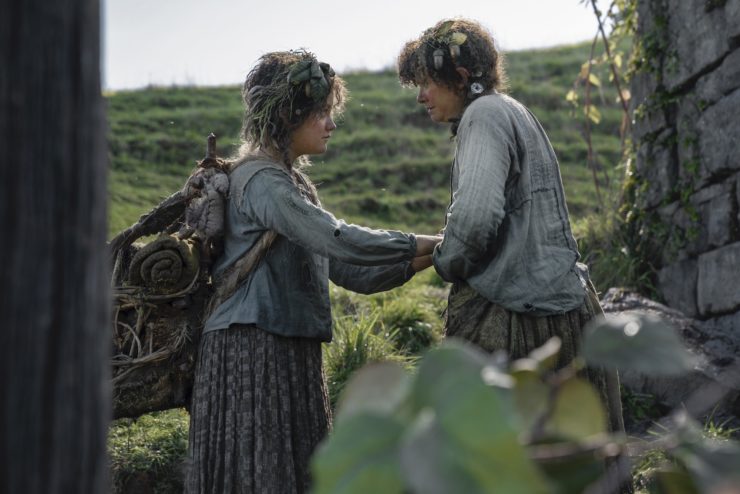
Still, there is much about The Rings of Power that I enjoyed. I will be forever grateful for baby-duckling Gandalf, and for Durin III and Durin IV and Disa and the general respect the show had for all the dwarves. I’m impressed that they won me over with Elrond, and with Theo, and that they pulled the wool over my eyes with Saubrand. Much in the way that the reveal of Halbrand’s true identity changed how I felt about everything they did with the character, there may be surprises in season two that change some of my feelings about season one. For now, I’m just going to go listen to “This Wandering Day” again.
Sylas K Barrett is still ready to watch an entire season that’s just The Adventures of Gandalf and Nori. He would also watch twelve about Durin and Disa, with plentiful Elrond cameos, please.










